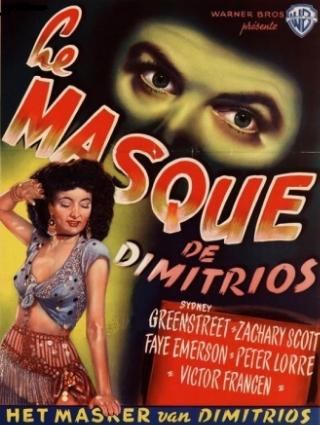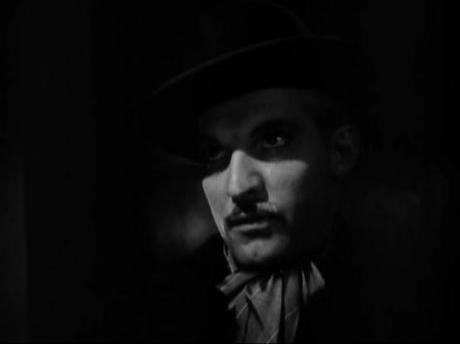
To me the most important thing to know about an assassination is not who fired the shot – but who paid for the bullet.
The passage of time can have a nasty tendency to cloud the memory, to cast a kind of nostalgic haze over things and distort reality. On occasion I’ve found this to be the case with films, where fondly remembered movies, those which have earned themselves a special place in the heart over the years, fail to live up to their promise. It’s quite a crushing disappointment to discover that a film we thought was wonderful long ago falls far short of the stellar image we’ve built up in our imagination. Happily though, that’s not always the case, and sometimes it just happens that the film we saw all those years ago really is the little gem we’ve been yearning to see again ever since. The Mask of Dimitrios (1944) is one such movie; I caught it once on a late night TV broadcast at some point during my teenage years and it made a big impression on me. However, it never seemed to show up again no matter how carefully I scoured the TV listing pages in the papers. It also remained stubbornly absent from DVD release schedules to the point I began to despair of ever seeing it again. In the interim I’d read the Eric Ambler novel from which it had been adapted, and that actually just served to increase my frustration. Anyway, when I finally learned of its DVD release this year I experienced a rush of excitement tinged with a hint of trepidation. Fortunately, the latter feeling turned out to be misplaced as I realized my memory hadn’t been cheating me. Ah, the ups and downs of being a movie fan!
It’s 1938 and the uncertainty and upheaval of the inter-war years will soon be swept aside by the approaching conflict. In Istanbul a group of children run happily along the shores of the Bosphorus. They halt abruptly, shocked by the gruesome sight before them. The body of a murdered man has washed up and now lies carelessly on the sand. The clothing and papers identify the remains as belonging to one Dimitrios Makropoulos, a Greek national and a man not unfamiliar to the authorities. Later that evening, at a party, the Turkish security officer in charge of the investigation falls into conversation with Cornelius Leyden (Peter Lorre), a mystery writer vacationing in the Levant. The tale of the shady character now lying on a mortuary slab intrigues Leyden and piques his writer’s interest. Armed with only a handful of dates and locations, Leyden takes it upon himself to satisfy his curiosity and make a stab at tracing the movements of this notorious figure. Leyden therefore sets out on a journey that will take him first to Athens, then on to Sofia, Belgrade, Geneva and finally Paris. Along the way, via a series of flashbacks narrated by an assortment of middle European types, he begins to piece together a picture of the mysterious and ruthless Dimitrios (Zachary Scott). At every turn though, Leyden’s path seems to cross that of Mr Peters (Sydney Greenstreet), a man whose interest in Dimitrios surpasses that of the diminutive writer. It soon becomes apparent that the threat posed by men such as Dimitrios doesn’t end with death, and that his malignant influence may even extend beyond the grave.

The Mask of Dimitrios is one of those pictures that sails awfully close to the boundaries of film noir; the fates of Dimitrios’ victims certainly moves it in that direction as does the shadowy photography and multiple flashbacks employed. However, despite the presence of these persuasive factors, it’s the mystery/espionage elements that dominate for the most part. The story comes from Eric Ambler’s finest novel (high praise indeed as the man rarely wrote anything weak) and I reckon the film stands as the best adaptation of his work to date. Generally, Ambler’s stories dealt with men who found themselves drawn unwittingly into the murky world of spying and underground politics. By having the bulk of the action play out in the Balkans, that hotbed of intrigue and shifting loyalties, The Mask of Dimitrios captures the mood of betrayal for profit beautifully. Both Ambler’s writing and Jean Negulesco’s atmospheric direction leave the viewer in no doubt that we’re being taken on a tour of a world of secrets, memories and confidences cherished for emotional and material value. For me there are two standout sequences in the movie. The first is the framing story in a cheap night club in Sofia. Faye Emerson is wonderfully weary and faded as she recounts her past with Dimitrios: the air is thick with a kind of smoky decadence, Emerson’s near lifeless eyes and drawn expression speak volumes, and the band plays Perfidia in the background. The other noteworthy episode is an extended flashback to an elaborate sting in Belgrade, where a minor government official has his own weakness manipulated in order to suck him into committing treason. The combination of Dimitrios’ cold slickness and Steven Geray’s portrayal of the poor dupe whose fragile ego, thwarted ambition and desperate desire to rise in his wife’s estimation makes it quite affecting.

Of the half-dozen or so movies that Greenstreet and Lorre made together in the 40s, The Mask of Dimitrios was the one that gave them the greatest opportunity to shine. Something like The Maltese Falcon handed them fascinating roles, but they were still only there to provide support for Bogart and Astor. This film, on the other hand, places the two men front and center and it’s their partnership as much as anything that carries the whole thing. As Peters, Greenstreet has the more ambiguous part, and gets to indulge in his patented trick of switching from jovial bonhomie to dark menace in the blink of an eye. Lorre acts as the viewer’s guide, half leading and half stumbling his way through the twisting tale. Zachary Scott is of course the true villain of the piece, and the movie offered him one of his best parts. He always had an oily charm that could be used to strong effect when necessary, but this time that quality remains largely buried beneath a cold, calculating facade. As the story progresses the full extent of Dimitrios’ foul character is gradually revealed, and Scott manages to convey very successfully just how dangerous this man truly is.
As I said at the beginning of this short piece, The Mask of Dimitrios was a difficult film to see for a long time. Earlier this year though, it appeared on DVD via the Warner Archives. At the time I felt ambivalent about this fact; I wanted to get my hands on the film but I’ve never managed to completely overcome my aversion to buying DVD-R products. When I learned over the summer that Absolute in Spain were putting out their own pressed disc version of the movie, I decided that was the one I’d go for. Absolute can generally be relied on to produce solid, attractive releases, and this is no exception. The image doesn’t display any noticeable damage and has nice contrast levels to show off the noirish photography. As usual with this company, subtitles are no issue and can be deselected from the setup menu. Extra features consist of the theatrical trailer and a booklet (in Spanish naturally) containing notes on the film and a good selection of stills. OK, so I had been a little fearful that the film wouldn’t prove as entertaining as I hoped, but it ended up being every bit as satisfying as I recalled. Personally, I think it’s a terrific example of the magic that studio bound B thrillers could conjure up when the right cast and crew were handed promising material. Do yourselves a favor folks and check this one out – it comes highly recommended.
